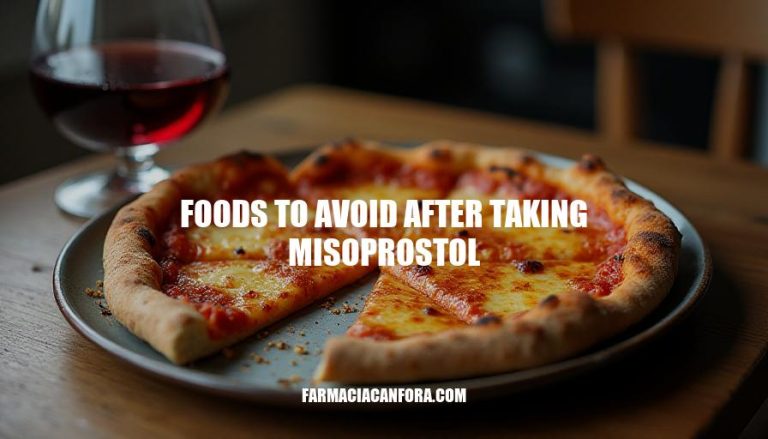


Misoprostol is a medication that helps with stomach problems, labor, and other issues. It’s often used alongside other medicines to make it work better.
When you take misoprostol, what you eat matters. Some foods can make side effects worse, like diarrhea, cramps, or nausea.
You should avoid things like coffee, spicy food, junk food, dairy products, and sugary snacks. Also, don’t drink alcohol for at least 24 hours after taking the medicine.
Choosing healthy foods can really help you feel better and recover faster. By avoiding these foods, you can give your body a chance to heal and reduce discomfort.
Spicy foods should be avoided after taking misoprostol because they can exacerbate gastrointestinal side effects such as stomach cramps, indigestion, and diarrhea. Misoprostol is known to cause digestive irritations, including abdominal pain, diarrhea, nausea, and vomiting. Consuming spicy foods can further irritate the digestive tract, leading to increased discomfort and potentially worsening these side effects.
Additionally, spicy foods can contribute to heartburn and acid reflux, which are common adverse effects of misoprostol.
Avoiding spicy foods can help manage these symptoms and promote a smoother recovery process.
In summary, foods to avoid after taking misoprostol include spicy or acidic foods, caffeinated drinks, junk food, dairy products, highly processed foods, and refined carbs. These dietary choices can help minimize digestive irritations and adverse effects, allowing for a more comfortable recovery.
High-fat foods can significantly impact the efficacy of misoprostol and increase gastrointestinal discomfort. Misoprostol is a medication used for various purposes, including medical abortion and the prevention of gastric ulcers. When taken, it can cause side effects such as stomach cramps, diarrhea, and vomiting.
Consuming high-fat foods after taking misoprostol can exacerbate these gastrointestinal side effects.
High-fat foods are harder to digest and can slow down the absorption of the medication, reducing its effectiveness. Additionally, these foods can increase the production of stomach acid, leading to more severe cramps and discomfort.
To minimize gastrointestinal discomfort and ensure the medication works effectively, it is important to avoid certain foods after taking misoprostol. Foods to avoid include:
Spicy or acidic foods (e.g., sodas, limes, tomatoes)
Caffeinated beverages (e.g., coffee, tea)
Processed or junk foods (e.g., fast food, chips)
High-sugar foods and refined carbs (e.g., sweets, pastries)
Dairy products (e.g., milk, cheese)
By avoiding these foods, you can help reduce gastrointestinal discomfort and improve the overall efficacy of misoprostol.
Foods to avoid after taking misoprostol include dairy products due to the potential for lactose intolerance and digestive issues. Misoprostol can cause gastrointestinal side effects such as diarrhea and indigestion. When someone with lactose intolerance consumes dairy products, undigested lactose can lead to bloating, gas, and diarrhea.
This can exacerbate the digestive issues already caused by misoprostol, making recovery more uncomfortable. Therefore, avoiding dairy products can help manage these symptoms and promote better digestive health during recovery.
Caffeine and carbonated beverages should be avoided for several reasons. Caffeine can relax the lower esophageal sphincter, leading to stomach acid reflux and indigestion. It can also cause dehydration, which is particularly concerning if you’re experiencing diarrhea or vomiting, common side effects of misoprostol.
Carbonated beverages, on the other hand, can cause bloating and gas, exacerbating stomach discomfort. Additionally, the acidity in these drinks can irritate the stomach lining, worsening gastrointestinal symptoms.
When taking misoprostol, it’s important to avoid foods and drinks that can interfere with its absorption and exacerbate its side effects. Caffeine and carbonated beverages fall into this category, as they can hinder proper nutrient absorption and increase gastrointestinal discomfort.
Instead, opt for water, herbal teas, and other non-caffeinated, non-carbonated beverages to stay hydrated and support your recovery.
Avoiding these beverages can help manage side effects and promote a smoother recovery process after taking misoprostol.
Alcohol consumption after taking misoprostol can lead to several adverse effects. It can exacerbate side effects such as nausea, vomiting, and diarrhea, which are already common with misoprostol. Alcohol can also increase the risk of dehydration due to its diuretic effect, which can be particularly dangerous when combined with the gastrointestinal side effects of misoprostol.
Additionally, alcohol can interact with misoprostol, potentially affecting its effectiveness and increasing the risk of complications such as excessive bleeding or infection.
It is generally recommended to avoid alcohol for at least 24 to 48 hours after taking misoprostol to allow the body to recover and reduce the risk of potential complications.
Foods to avoid after taking misoprostol include caffeinated drinks, spicy or acidic foods, junk food, dairy products, highly processed foods, and refined carbs. These foods can worsen gastrointestinal discomfort and delay recovery.
It’s essential to be mindful of your diet when taking misoprostol to minimize side effects and ensure the medication works effectively.
Foods to avoid after taking misoprostol include:
Avoiding these dietary choices can help manage digestive irritations and adverse effects, promoting a smoother recovery process.
Avoiding high-fat foods can also impact the efficacy of misoprostol and increase gastrointestinal discomfort.
Additionally, consuming alcohol after taking misoprostol can exacerbate side effects and interact with the medication, increasing the risk of complications.
By avoiding these foods and drinks, you can help reduce gastrointestinal discomfort, improve the overall efficacy of misoprostol, and support a more comfortable recovery.